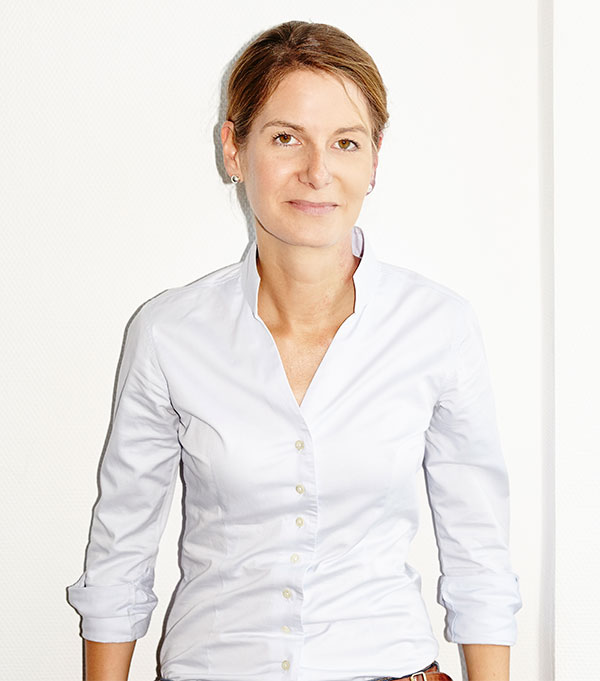The new Bild: Tanit Koch

Simply sign up to the Life & Arts myFT Digest -- delivered directly to your inbox.
With her soft voice and intellectual air, Tanit Koch might seem suited to the editorial board of a scholarly journal or perhaps a professorship at Tübingen, the venerable university where she wrote a thesis on the European Court of Justice. Nevertheless, the slight 38-year-old is the first female editor of Bild, Germany’s top-selling, flesh-displaying, sensation-peddling daily newspaper.
According to Koch, the Bild newsroom is nothing like the stereotype of a popular newspaper staffed by “guys shouting all over the place and naked girls lap-dancing on the tables. I mean, if we were shouting at each other like that, you couldn’t do what we do, which is high-voltage, great professionalism, exciting, a lot of debating going on.”
We are sitting in the 19-storey building in Berlin erected by the late Axel Springer, who, while creating one of Germany’s largest postwar media groups, founded Bild in 1952. Although mindful of the group’s traditions, Koch is focused on editing the paper of today, a time of unprecedented commercial, technological and regulatory challenges. “The pressure is up and we pressurise ourselves because we want to shoot for the moon,” she says.
Despite a decline in circulation from the highs of the 1980s, Bild is Europe’s best-selling newspaper; with a circulation of two million it is well ahead of the Sun, the British daily with which it is often compared. Like the Sun, it is raunchy and rude: a recent feature compared men’s genitals to different vegetables and asked male readers: “Courgette, aubergine or gherkin — what penis-type are you?”
The broadsheet-sized Bild is tabloid in spirit, offering a mix of crime, sex, sport and celebrity gossip. It receives more reprimands from the German Press Council, the media watchdog, than any other publication. It gets embroiled in court cases. Kai Diekmann, Koch’s predecessor and now Bild’s publisher, once famously went to court alleging libel and infringement of his personal rights when the rival Tageszeitung newspaper claimed wrongly (in a satirical story) that he had undergone penis-enlargement surgery. Diekmann won but the judge awarded zero damages — on the grounds that, as an originator of similarly invasive articles, the Bild editor should take the story on the chin.
Yet the newspaper has a serious side. This year’s coups include interviews with presidents Barack Obama of the US, François Hollande of France and Russia’s Vladimir Putin. The refugee crisis has been meticulously covered. The rightwing populist party Alternative for Germany has been investigated, not least the finances of some activists. Brexit, too, has been a big issue, with the paper backing the UK’s EU membership and now lamenting its threatened departure. After the vote Koch wrote a signed editorial entitled “British tragedy”, saying “the fate of the EU and the UK is now uncertain”.
The paper also campaigns. With “We help” it has encouraged readers to volunteer to work with the one million refugees who have arrived in Germany in the past 15 months. But on the Greek financial crisis, it has taken a tough line — backing the sceptical German taxpayer and opposing bailouts.
Koch, who took charge at Bild on January 1, grew up far from this rough-and-tumble world, in Bonn. Her parents — mother, a political lobbyist; father, an archaeologist — sent her to St Columba’s College, an Irish boarding school, for two years at the age of 15. After polishing her excellent English, she returned to Germany, where she acquired degrees in law and politics, before plumping for journalism “because I just always wanted to be one”.

Koch says she had the “usual prejudice” about tabloid journalism but she had also read that Bild offered the best training after reading a book by Wolf Schneider, a veteran journalism expert. She joined the paper, aged 27, in 2005, as a trainee journalist, after being interviewed by editors including Diekmann. She says: “My only goal was to not be kicked out, learn the craft, and then be a parliamentary or maybe foreign correspondent, full stop. Luckily, somebody else saw more in me.”
That somebody was Diekmann. In 2007 he made her his office manager, which gave her an overview of the paper. Promotion followed quickly: special editions editor at Welt, another Springer daily paper in 2009; editor of Bild’s Hamburg regional edition in 2011; and Bild entertainment editor in 2013.
Was the speed of her promotion odd? “Totally,” she says. But as a result of this speed, she has, she says, never had any sense of being a woman struggling to succeed in a man’s world. “I know there is a glass ceiling . . . but I’ve never experienced it.”
Koch is in charge of the print paper, in parallel with the 36-year-old digital editor Julian Reichelt. As for Diekmann, she says: “He doesn’t interfere in my daily [work] but he might come up the next day and say, ‘I would have done that differently.’”
Circulation is falling on the paper, sold mainly on newsstands at €0.90: it is down from 2.7 million three years ago, having peaked at more than five million in the 1980s. Online subscriptions, launched in 2013, have risen to 320,000. The website is split between free and subscription material, with subscriptions from €4.99 a month. Springer does not disclose Bild’s financial performance but Koch says Bild is making more money than when its circulation peaked, thanks to higher cover and advertising prices, and growing online subscription income.
In her few short months in charge, she has overseen a newsroom reorganisation to bring print and digital operations closer together. “With all the new technical opportunities, we just embrace them and do what we do best, which is storytelling. So it isn’t just that double spread with huge pictures in the paper — it’s a 360-degree documentary.”
Koch speaks respectfully of the Sun, where she spent a week in 2008 as an intern, when Rebekah Wade (now Brooks) was the editor. And while she says, “You’ve had cases where [competition between tabloids] brought out the worst — there were things that shouldn’t have [been] gotten into,” she admires “the courage” of the British press.
In Germany privacy laws are tight, with even the government’s rights to snoop severely restricted. But Koch argues journalists must push against the rules when the public interest in a story is sufficiently important. She cites the case of Rainer Speer, a politician who fathered a child in an extramarital affair and let the mother declare that the father was unknown, leaving the taxpayer paying child maintenance.
When Bild broke the story in 2010, using evidence from private emails, Speer, who had to quit his ministerial post in the Brandenburg region, went to court alleging invasion of privacy. After lengthy legal proceedings, an appeal court eventually found in Bild’s favour citing the “high public interest” of the case.
She adds: “The real problem in Germany is that the public interest is increasingly underrated and not seen as equal to individual interests or privacy rights.” She cites a current court case, in which a 44-year-old man is accused of the attempted murder of Cologne mayor Henrietta Reker, on the day before she was elected last year.
Koch says that, although the defendant’s identity is not disputed, the court has ordered the media to pixelate his face when using his picture. Most publications have complied, but not Bild.
She is also battling what she sees as a drive by police to withhold information about criminal suspects’ ethnic identity. For example, it took three days before the Cologne police disclosed the scale of the mass sex assault on women in the city on New Year’s Eve. Amid public concern, the police did say that most suspects were of “Arab or north African appearance”, but in many other incidents, ethnic origin is not made public.
Koch says: “For very good reason, there is a very high sensitivity in Germany [about] xenophobia, and I think we must be more sensitive, but not at the price that people who have very real questions and concerns are being misled and pushed aside.”
However, the Bild editor is not for media freedom at any price. Somewhat surprisingly, she has intervened in Germany’s biggest media rights case this year to criticise comedian Jan Böhmermann.
Böhmermann performed an obscene poem on a TV show about Turkish president Recep Tayyip Erdogan, who launched a criminal case in Germany against the comedian for insulting behaviour. Among those who sprang to Böhmermann’s defence was Mathias Döpfner, Springer chief executive. But Bild’s editor took a different view. In another signed editorial, she wrote: “Clearly, Jan Böhmermann was too busy rolling around on the floor with laughter to consider the consequences of his vulgar poem,” implying that he should have known better than to be so insulting.
She does hold ZDF, the public broadcaster that put out the show, responsible. “You draw the line when it comes to editing,” she says. “I kick out things I find unfit to be printed every day.”
Initially, Bild supported the welcome that German chancellor Angela Merkel extended last summer to Syrian migrants. But, like other media, the paper has become more critical as the challenges involved in integrating the newcomers have come to the fore. Welcoming refugees should not, Koch says, stop the paper from reporting on “the costs for German society”.
She is forthright when it comes to defending and promoting Bild, and not just on weighty questions of media freedom. She supports the paper’s liberal use of semi-nude female pictures, which she describes as part of the “brand identity”.
Bild’s focus is, she says, on the women’s stories, not their bodies. “It’s sometimes interesting if there is a girl who’s working in a garage . . . in her overalls, and then [we] do a story about her . . . it’s not actually reducing women to their physiques. I think people make too much fuss. I’ve never heard any feminist complain about Botticelli. I don’t want to exaggerate — this is not Botticelli that we have. But . . . ”
Stefan Wagstyl is the FT’s chief Germany correspondent
Photographs: Eva Tuerbl
Comments